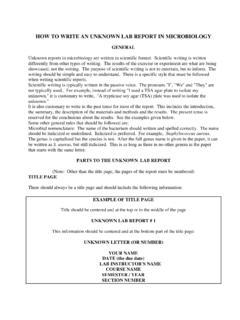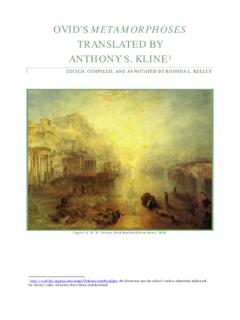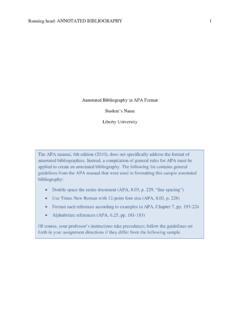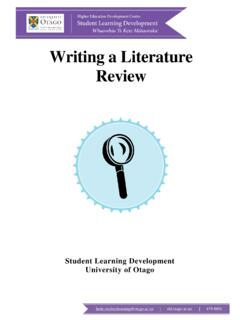Transcription of SYMPOSIUM By Plato Translated by Benjamin Jowett
1 SYMPOSIUM . By Plato Translated by Benjamin Jowett Edited, annotated , and compiled by Rhonda L. Kelley Plate 1: Anselm Feuerbach, The SYMPOSIUM (Second Version), 1873. Alcibiades (far left, drunk); Pausanias (behind Agathon); Agathon (centre); Socrates (bent head); Aristophanes (facing Socrates, black beard); Aristodemus (figure against wall behind Socrates). Table of Contents List of Plates .. 2. Editorial note: .. 2. PERSONS OF THE DIALOGUE: .. 4. SCENE: The House of Agathon. 416 BC.. 4. Prologue .. 4. Phaedrus .. 9. Pausanias .. 11. Eryximachus .. 15. Aristophanes .. 18. Agathon .. 22. Socrates .. 26. Alcibiades .. 36. Conclusion .. 44. Table: The Banqueters.. 45. Gallery .. 46. 51. List of Plates Plate 1: Anselm Feuerbach, The SYMPOSIUM (Second Version), 1873.. 1. Plate 2: Nikolai Ge, Achilles Lamenting the Death of Patroclus, 9. Plate 3: Harmodius (right) and Aristogeiton (left); Roman copy of Greek original.. 11. Plate 4: Asclepius and Hygeia (480-450 BC).
2 15. Figure 4: The androgyne .. 18. Figure 5: Antonio Canova, Psyche Revived by Cupid's Kiss, 22. Figure 6 Socrates Learning from Diotima, Franc Kav i , 1810.. 26. Figure 7: Anton Petter, Socrates reproaching Alcibiades, (1816).. 36. Figure 8 Alcibiades being taught by Socrates, Fran ois-Andr Vincent, 1776.. 39. Figure 9 The Wounded Alcibiades, Jean Charles Nicaise Perrin, 18th c.. 42. Figure 10 Figure 11 Cosroe Dusi, Alcibiades amongst the hetaerae, 19th c.. 46. Figure 11 Jean-Baptiste Regnault, Socrates dragging Alcibiades from the Embrace of Sensual Pleasure, 47. Figure 12 Jean-L on G r me, Socrates seeking Alcibiades in the house of Aspasia, 1861.. 48. Figure 13 Louis-Jean-Fran ois Lagren e, Alcibiades on his Knees Before his Mistress, 1781 49. Figure 14 Alcibiades (standing) with Socrates (seated left) and Aspasia, depicted in the painting Socrates and Alcibiades at Aspasia by Nicolas-Andr Monsiau, 1801; in the Pushkin Fine Arts Museum, Moscow.
3 50. Figure 15 Antonio Canova, Socrates saves Alcibiades in the Battle of Potidea (1797), Accademia Nazionale di San Luca (Rome) .. 50. Editorial note: I have used primarily the translation of Jowett , but have substituted the translation of Fowler for words, phrases, or sentences that seemed to me to be more logical or beautiful. These substitutions are indicated in the footnotes. Having no facility with Greek, I used Bury's commentary and the Perseus Digital Library's lexicon to help me make these decisions. In addition to these substitutions, I have edited Jowett 's translation for punctuation, grammar, and formatting not consistent with the conventions of Standard English. Plato 's narrative style switches point of view so frequently that it can be confusing for students newly approaching the dialogues. Therefore, I have edited the pronouns and formatting for clarity's sake. These corrections should not be noticeable to the reader. Words appearing in brackets without a footnote indicating the source are my own additions and substitutions.
4 It is my hope that this edition will make the SYMPOSIUM as accessible as possible to the modern college student. RLK. PERSONS OF THE DIALOGUE: Apollodorus: the narrator of this dialogue, but not an attendant of the banquet; a wealthy follower of Socrates from Phalerum; he was only 13 when the banquet took place. Aristodemus: a little fellow, who never wore any shoes is the man who told the tale to Apollodorus and whom Apollodorus is quoting; he was at the SYMPOSIUM , but did not deliver a speech (encomium). Glaucon: possibly, Plato 's older brother Phaedrus: Aristocratic Athenian Pausanias: lawyer; Agathon's lover Eryximachus: physician Aristophanes: comedic playwright Agathon: tragic playwright Socrates: Athenian philosopher; founder of the Western tradition of philosophy. Alcibiades: Athenian aristocrat and general A Troop of Revellers: accompanying Alcibiades. SCENE: The House of Agathon. 416 BC. Prologue APOLLODORUS: Concerning the things 1 about which you 2 ask to be informed I believe that I.
5 Am not ill-prepared with an answer. For the day before yesterday I was coming from my own home at Phalerum to the city, 3 and one of my acquaintance, who had caught a sight of me from behind, calling out playfully in the distance, said: Apollodorus, O thou Phalerian man, halt! So I. did as I was bid; and then he said, I was looking for you, Apollodorus, only just now, that I. might ask you about the speeches in praise of love, which were delivered by Socrates, Alcibiades, and others, at Agathon's supper. Phoenix, the son of Philip, told another person who told me of them; his narrative was very indistinct, but he said that you knew, and I wish that you would give me an account of them. Who, if not you, should be the reporter of the words of your friend? And first tell me, he said, were you present at this meeting? 4. Your informant, Glaucon, I said, must have been very indistinct indeed, if you imagine that the occasion was recent; or that I could have been of the party.
6 Why, yes, he replied, I thought so.. Impossible, I said. Are you ignorant that for many years Agathon has not resided at Athens; and not three [years] have elapsed since I became acquainted with Socrates, and have made it my daily business to know all that he says and does. There was a time when I was running about the world, fancying myself to be well employed, but I was really a most wretched being, no better than you are now. I thought that I ought to do anything rather than be a philosopher.. Well, he said, jesting apart, tell me when the meeting occurred.. In our boyhood, I replied, when Agathon won the prize with his first tragedy, on the day after that on which he and his chorus offered the sacrifice of victory.. Then it must have been a long while ago, he said; and who told you did Socrates? . 1. The story of the SYMPOSIUM or banquet held at Agathon's house and attended by Socrates. 2. The man to whom Apollodorus is narrating the tale is uunknown.
7 3. Athens. 4. Note the perhaps intentionally confusing chain of the narrative, including unnamed men and friends of friends; Bury suggests that Plato wrote The SYMPOSIUM to correct inaccurate accounts of the banquet floating around the rumor mill (R. G. Bury. The SYMPOSIUM of Plato . Cambridge: W. Heffer and Sons [1909]. Perseus Digital Library). No indeed, I replied, but the same person who told Phoenix; he was a little fellow, who never wore any shoes, Aristodemus, of the deme 5 of Cydathenaeum. 6 He had been at Agathon's feast; and I think that in those days there was no one who was a more devoted admirer of Socrates. Moreover, I have asked Socrates about the truth of some parts of his narrative, and he confirmed them.. Then, said Glaucon, let us have the tale over again; is not the road to Athens just made for conversation? And so we walked, and talked of the discourses on love; and therefore, as I. said at first, I am not ill-prepared to comply with your request, and will have another rehearsal of them if you like.
8 For to speak or to hear others speak of philosophy always gives me the greatest pleasure, to say nothing of the profit. But when I hear another strain, especially that of you rich men and traders, such conversation displeases me; and I pity you who are my companions, because you think that you are doing something when in reality you are doing nothing. And I dare say that you pity me in return, whom you regard as an unhappy creature, and very probably you are right. But I certainly know of you what you only think of me there is the difference. COMPANION: I see, Apollodorus, that you are just the same [as] always, speaking evil of yourself, and of others; and I do believe that you pity all mankind, with the exception of Socrates, yourself first of all, true in this to your old name, which, however deserved, I know not how you acquired, of Apollodorus the madman; for you are always raging against yourself and everybody but Socrates. APOLLODORUS: Yes, friend, and the reason why I am said to be mad, and out of my wits, is just because I have these notions of myself and you; no other evidence is required.
9 COMPANION: No more of that, Apollodorus; but let me renew my request that you would repeat the conversation. APOLLODORUS: Well, the tale of love was on this wise: But perhaps I had better begin at the beginning, and endeavour to give you the exact words of Aristodemus. [ARISTODEMUS Speaking to APOLLODORUS]. I met Socrates fresh from the bath and sandalled; 7 and as the sight of the sandals was unusual, I asked him whither he was going that he had been converted into such a beau. 8. To a banquet at Agathon's, he replied, whose invitation to his sacrifice of victory 9 I. refused yesterday, fearing a crowd, but promising that I would come to-day instead; and so I. have put on my finery, because he is such a fine man. What say you to going with me unasked? . I will do as you bid me, I replied. Follow then, he said, and let us demolish the proverb, To the feasts of inferior men the good unbidden go;' 10 Instead of which our proverb will run, To the feasts of the [Goodman] the good [men] unbidden go;' 11 and this alteration may be supported by the authority of Homer 12.
10 Himself, who not only demolishes but literally outrages the proverb. For, after picturing Agamemnon as the most valiant of men, he makes Menelaus, who is but a fainthearted warrior, come unbidden to the banquet of Agamemnon, who is feasting and offering sacrifices; not the better [man] to the worse, but the worse [man] to the better.. 5. Township. 6. Also the hometown of Aristophanes. 7. That is, Socrates had just put his shoes on; Aristodemus possibly makes note of this fact because he himself eschews shoes or because Socrates rarely wore his best shoes. 8. Handsome man. 9. Agathon won the prize at the Dionysia (a theatrical competition and religious festival) in 416 BC. Agathon has been celebrating this accomplishment with sacrifices and feasts. 10. That is, a good man does not need an invitation to an inferior man's dinner. 11. Socrates is punning Agathon's name (which can be Translated as Goodman ). 12. Il. I rather fear, Socrates, said I, lest this may still be my case; and that, like Menelaus in Homer, I shall be the [fool], who To the feasts of the wise unbidden goes.












